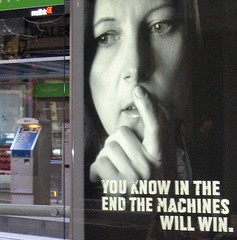 The question seems to keep coming up as to whether it’s legal for Myki machines to not accept 5 cent coins; or indeed whether it’s legal for Metcard machines on trams to only accept coins (not notes).
The question seems to keep coming up as to whether it’s legal for Myki machines to not accept 5 cent coins; or indeed whether it’s legal for Metcard machines on trams to only accept coins (not notes).
Some people assume that because it’s all legal tender, it must be against the law to demand specific currency, or otherwise limit the payment options (such as only providing a limited amount of change).
As this page from the Reserve Bank says, legal tender doesn’t mean there’s any obligation to accept it:
It is the Reserve Bank of Australia’s understanding that, although Australian currency has legal tender status, it does not necessarily have to be used in transactions and that refusal to accept payment in legal tender banknotes and coins is not unlawful.
So you might not like it, but it’s not illegal.
PS. Some people even claim stuff like this that they don’t like is unconstitutional, and someone should be taken to court. Good luck with that.
9 replies on “No, the law doesn’t demand that Myki accept 5 cent coins, or that Metcard machines accept notes”
Yes…… I dont think anything is wrong with machines accepting coins….
thats another good way of getting rid of loose change…
Offhand I can’t remember the outcome, but a fellow called Lev Lafayette won a case a few years back on the machines-not-accepting-notes issue. I think he then lost on appeal to the Supreme Court. I can’t be ar5ed looking it up right now.
But, what legal tender actually means is that while it may not be unlawful per se to refuse to accept notes/coins as payment, if you’re trying to collect money owed to you, you’ll probably not be able to enforce payment any other way. If you’re offering goods or services for sale, then not accepting cash then gives your prospective customer the choice of proceeding or not proceeding with the transaction.
Notes and coins are legal tender for DEBTS.
Paying a fare is making a purchase and has nothing to do with a debt
With vaughan’s comment I think the law should also take into account whether the service or goods are essential or not. i.e. Water is an essential service, I need it to live, if I have legal tender to pay for it regardless of the denomination, you need to sell it to me. The next question would then be whether public transport is an essential service.
There is a difference between paying a debt, and buying stuff.
If you owe someone money, they have to accept cash. They can’t turn it down.
Except the tax office, for some obscure reason.
Time to abolish five cent pieces. Most parking ticket machines I have used in the last few years don’t accept five cent pieces.
@Vaughan, I think Lafayette’s case was on the basis that it was not universally known that notes weren’t accepted (and specifically that it had not been gazetted as required by the Transport Act). My recollection is that pretty soon afterwards signage went up on trams and at tram stops to point this out – and no doubt they properly gazetted it as well! Story from the original case. Another with the govt announcing they’d appeal.
@Tony, just to muddy the waters, what happens if you get your Myki card balance into the negative? Would topping it back up into positive be “paying a debt”?
Or how about buying a ticket on a tram? You’re taking advantage of the service already, surely there’s a debt there?
But fundamentally I agree with Andrew. Five cents today is worth half a cent when demicalised currency first came in. Let’s just copy New Zealand and get rid of the silly things. (And, I’m inclined to say, introduce a $5 coin to replace the $5 note, but other people seem to like the notes.)
Yeah, I’d like to see the 5c coin removed as well, along with a resizing of all of our coins, like New Zealand did. The 10c, 20c and 50c pieces are just far too big.